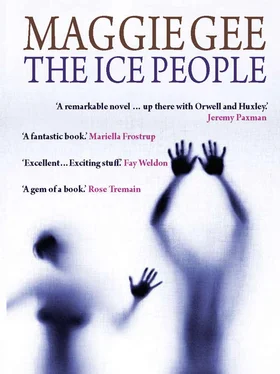Maggie Gee - The Ice People
Здесь есть возможность читать онлайн «Maggie Gee - The Ice People» весь текст электронной книги совершенно бесплатно (целиком полную версию без сокращений). В некоторых случаях можно слушать аудио, скачать через торрент в формате fb2 и присутствует краткое содержание. Год выпуска: 2008, Издательство: Telegram Books, Жанр: Фантастика и фэнтези, на английском языке. Описание произведения, (предисловие) а так же отзывы посетителей доступны на портале библиотеки ЛибКат.
- Название:The Ice People
- Автор:
- Издательство:Telegram Books
- Жанр:
- Год:2008
- ISBN:нет данных
- Рейтинг книги:4 / 5. Голосов: 1
-
Избранное:Добавить в избранное
- Отзывы:
-
Ваша оценка:
- 80
- 1
- 2
- 3
- 4
- 5
The Ice People: краткое содержание, описание и аннотация
Предлагаем к чтению аннотацию, описание, краткое содержание или предисловие (зависит от того, что написал сам автор книги «The Ice People»). Если вы не нашли необходимую информацию о книге — напишите в комментариях, мы постараемся отыскать её.
imagines an ice age enveloping the Northern Hemisphere. It is Africa’s relative warmth that offers a last hope to northerly survivors. As relationships between men and women break down, the novel charts one man’s struggle to save his alienated son and bring him to the south and to salvation.
Maggie Gee
The White Family
The Flood
The Ice People — читать онлайн бесплатно полную книгу (весь текст) целиком
Ниже представлен текст книги, разбитый по страницам. Система сохранения места последней прочитанной страницы, позволяет с удобством читать онлайн бесплатно книгу «The Ice People», без необходимости каждый раз заново искать на чём Вы остановились. Поставьте закладку, и сможете в любой момент перейти на страницу, на которой закончили чтение.
Интервал:
Закладка:
The whole developed world wanted them. Everyone in our apartment block had them. The porter told us about new arrivals. And Sarah, who’d sworn she would never have another one, soon began to feel envious.
She was prone to envy, of everyone. Maybe because as a little girl she was sent to her Scottish grandma once too often. Out there on her own in the icy fogs, dressed in her cousins’ handmedowns. There were times in her life when she did feel loved — she knew I loved her, she must have done — and she was successful, on top of the world. But part of her was always left outside, peering into the room where the lights were on and the other children tore open their presents.
We had never moved to the pretty house in the Northwest Enclaves she’d dreamed about. Not because we weren’t wealthy enough, but because we had not ‘resolved our future as a family’, or whatever nonsense Sarah spouted. And yet it began to grate on her that we lived in a flat, however large and comfortable. One of our stuffier dinner guests asked her, ‘Is this your city base, Sarah?’, as if convinced we had a place in the country.
She felt she should have a place in the country. She ‘loved nature’, whatever that meant. I tried to make her see that now nothing was natural, that the flowers she loved had been selectively bred to make them bigger and longer lasting, that even the hills behind the Northwest Borders, which we could just glimpse from our fourthfloor window, were covered with genetically modified crops …
She stared out of the window while I lectured her, looking resentful, or possibly sad. She waited until I had finished talking. ‘It’s the colour,’ she said. ‘That blue. And that yellow.’ (It was autumn, and the trees were turning.) ‘So beautiful. I love those hills. I’d like my children to live there.’ She deluded herself, for she only had one, but she wanted another, so she often said ‘children’. Whatever she wanted, she thought she should have. ‘You’ve changed,’ she said. ‘You’ve changed completely. You used to dream of living somewhere wild. You used to talk about … beaches, and forests.’
‘It must be middle age,’ I said. ‘I’m getting fat and old and grey.’ I wanted her to deny it, but instead it awoke her tenderness. She put her white smooth arms around me, and pressed my face against her breast, holding my head as if she cared about it, her fingers clinging to my curly hair.
‘You’re not old, darling. You can’t be old.’
But the tenderness did not last very long.
‘I shouldn’t have to live in a flat at my age,’ she said, absurdly, as if it were my fault, as if I had the slightest control over where she spent the night, let alone lived.
‘We could afford not to,’ I said calmly.
‘I would miss my friends,’ she snapped at once. Which showed a kind of change in her. Once upon a time she would have cited work, the exact amount of journey time the move would have added. Now work was becoming less central than before. Sarah was in her late forties, after all, and the screens had begun to tire of her. Last year she had twice disappeared for a ‘holiday’ and returned a little shaky, her skin babypink and covered in cream, avoiding strong light — but despite the peels, she was ageing. She no longer spoke of her longing to conceive, though we still had sex, and without contraception. Our hopes had become too ingrown to risk voicing, not to ourselves, never to each other –
She was my love; my enemy. She gave me great pain, but I still loved her.
‘I feel … I don’t have the things I want,’ she muttered, frustrated, yet appealing to me, as if I were still the absent Daddy, the one who could have given it all, if he’d cared.
I couldn’t ever fill that hole. No one would. No one could.
‘I could find a place with a garden,’ I said. ‘Luke would love it if we had a garden.’ Though that was less true than it had once been, for he had become quieter, more nervous, recently, more wrapped up in his music, less boyish, somehow. He spent a lot of time with Juno and the ‘Communards’. ‘By the way, is he staying the night with the Communards?’ It was Saturday, and Luke wasn’t at home.
‘Don’t say Communards. It sounds silly.’
‘Well, the ‘Children’s Commune’ sounds pretty silly —’
‘No it isn’t. It’s a perfectly good name.’
‘Communard comes from commune, Sarah.’
‘You’re laughing at me. You undermine me. Then you wonder why I want to leave you —’
(Mygod, she’d been ‘leaving’ me for nearly twenty years.)
‘We could buy a house and live together.’ I went back to it dumbly, again and again. ‘I don’t see the problem. You can still see your friends.’
‘They’re not just some silly indulgence, you know. They matter to me. They’re … my life,’ she said. ‘And Lukey’s life.’
Which made me feel pointless. ‘That’s stupid,’ I said. ‘Bloody Juno and her cronies are not Luke’s life.’
‘How well do you know your son?’ she enquired. ‘How often does he sing to you?’
This was unfair, but left me winded. ‘That’s not our thing,’ I said, unhappily. ‘Luke and me have our own thing, you know. It’s … father and son. That matters as well.’ (And we did. We joshed. We vegged. We wrestled. We ate the sugarbombs Sarah detested, screaming at me ‘He needs fruit, not sweets!’)
There was a long pause. It was a lovely afternoon, late October, clear and golden, and the window was open, and by the same magic trick as in the last few years there was something in the air like the autumn chill we used to read about in books.
‘Feel the air, Sarah,’ I said, touching her hand. She loved things like that; air, water. ‘It’s wonderful. There’s … an edge. It’s cool.’ It wasn’t much, but I liked to please her. We sat together, taking it in.
‘Are you happy?’ she asked suddenly. ‘I don’t know if you’re happy, either. We’re … rushing through life, aren’t we? Getting older.’ And she stared out of the window, as she often did, as if it would eventually give her the answer, that same long view across the aching roads and the rustred suburbs to the sunblurred towers and beyond them the low blue hills she loved. ‘I stopped you travelling, I think. You wanted to. To see the world. I do — like you. You’re not a bad man. You stayed with me. You stuck around …’ And then she was clutching my hands and crying as if she had done me some massive wrong.
But the tears released some tension in her and within minutes she was herself again, abstracted, planning, chattering, restless, screenwatching, cleaning, talking on the phone, preparing to go away for the night, changing her plans, then again, then again — and it got dark, and she closed the window.
Around nineoclock she called me over to the screen. ‘Come and have a look. There’s another new range.’ She didn’t even have to say what of; we were all obsessed with Doves in those days. ‘This is absurd,’ she said to me, laughing, but she was fascinated, all the same.
Four new types of Dove were coming on the market. All of them had the most popular features of the current mobots, like ‘skin‘ and ‘feathers’ that felt warm and soft, RefuelRecycle, selfstarting et cetera. But the new models were highly specialised. There were ‘Culturevultures’, which included a scan of all the books that had ever been written, with universal translation, and a full hive of all Euro music ever recorded, plus the contents of the world’s great galleries and the ‘World’s Hundred Greatest Movies’, though these were mostly ‘obscure foreign films’ from the last century that ‘no one has heard of’, the TV presenter said, with a contemptuous smile. (‘I’d be better than him,’ Sarah said, in passing. ‘I like old films. They have such great stories.’) There were ‘Warmbots’, whose very existence would have been unthinkable until the last two years. They had furry exteriors and long thick arms and promised to ‘keep you warm at nights’. There were ‘Sexbots’, though we didn’t find out exactly what they did that evening because our screen had the automatic KC (kiddiescleanup) function that blocked out any mention of sex, and neither of us could remember how to unlock it before the moron had passed on to the next, but from his face and gestures the Sexbots were on heat. (But I have three Sexbots in my store. They look battered, and used. They look … undesirable. No one would dream of having sex with them.) The fourth variety of Dove was a ‘Hawk’, a kind of avian guard dog, really, ‘for defensive purposes only’, he assured us. They had stern beaked heads and watchful eyes. Their defence system sounded unbelievably aggressive. It was called ‘SD and R’, Selfdefend and Recycle; a high-pitched scream to deafen any ‘attackers’, an ‘immobiliser flagel’ to paralyse them, then finally the Hawk would cut up its victims and recycle them in the normal way.
Читать дальшеИнтервал:
Закладка:
Похожие книги на «The Ice People»
Представляем Вашему вниманию похожие книги на «The Ice People» списком для выбора. Мы отобрали схожую по названию и смыслу литературу в надежде предоставить читателям больше вариантов отыскать новые, интересные, ещё непрочитанные произведения.
Обсуждение, отзывы о книге «The Ice People» и просто собственные мнения читателей. Оставьте ваши комментарии, напишите, что Вы думаете о произведении, его смысле или главных героях. Укажите что конкретно понравилось, а что нет, и почему Вы так считаете.












